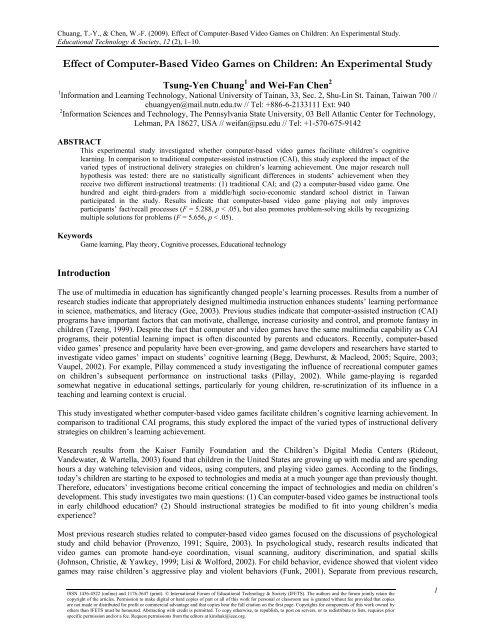Download - Educational Technology & Society
Download - Educational Technology & Society
Download - Educational Technology & Society
You also want an ePaper? Increase the reach of your titles
YUMPU automatically turns print PDFs into web optimized ePapers that Google loves.
Chuang, T.-Y., & Chen, W.-F. (2009). Effect of Computer-Based Video Games on Children: An Experimental Study.<br />
<strong>Educational</strong> <strong>Technology</strong> & <strong>Society</strong>, 12 (2), 1–10.<br />
Effect of Computer-Based Video Games on Children: An Experimental Study<br />
Tsung-Yen Chuang 1 and Wei-Fan Chen 2<br />
1 Information and Learning <strong>Technology</strong>, National University of Tainan, 33, Sec. 2, Shu-Lin St. Tainan, Taiwan 700 //<br />
chuangyen@mail.nutn.edu.tw // Tel: +886-6-2133111 Ext: 940<br />
2 Information Sciences and <strong>Technology</strong>, The Pennsylvania State University, 03 Bell Atlantic Center for <strong>Technology</strong>,<br />
Lehman, PA 18627, USA // weifan@psu.edu // Tel: +1-570-675-9142<br />
ABSTRACT<br />
This experimental study investigated whether computer-based video games facilitate children’s cognitive<br />
learning. In comparison to traditional computer-assisted instruction (CAI), this study explored the impact of the<br />
varied types of instructional delivery strategies on children’s learning achievement. One major research null<br />
hypothesis was tested: there are no statistically significant differences in students’ achievement when they<br />
receive two different instructional treatments: (1) traditional CAI; and (2) a computer-based video game. One<br />
hundred and eight third-graders from a middle/high socio-economic standard school district in Taiwan<br />
participated in the study. Results indicate that computer-based video game playing not only improves<br />
participants’ fact/recall processes (F = 5.288, p < .05), but also promotes problem-solving skills by recognizing<br />
multiple solutions for problems (F = 5.656, p < .05).<br />
Keywords<br />
Game learning, Play theory, Cognitive processes, <strong>Educational</strong> technology<br />
Introduction<br />
The use of multimedia in education has significantly changed people’s learning processes. Results from a number of<br />
research studies indicate that appropriately designed multimedia instruction enhances students’ learning performance<br />
in science, mathematics, and literacy (Gee, 2003). Previous studies indicate that computer-assisted instruction (CAI)<br />
programs have important factors that can motivate, challenge, increase curiosity and control, and promote fantasy in<br />
children (Tzeng, 1999). Despite the fact that computer and video games have the same multimedia capability as CAI<br />
programs, their potential learning impact is often discounted by parents and educators. Recently, computer-based<br />
video games’ presence and popularity have been ever-growing, and game developers and researchers have started to<br />
investigate video games’ impact on students’ cognitive learning (Begg, Dewhurst, & Macleod, 2005; Squire, 2003;<br />
Vaupel, 2002). For example, Pillay commenced a study investigating the influence of recreational computer games<br />
on children’s subsequent performance on instructional tasks (Pillay, 2002). While game-playing is regarded<br />
somewhat negative in educational settings, particularly for young children, re-scrutinization of its influence in a<br />
teaching and learning context is crucial.<br />
This study investigated whether computer-based video games facilitate children’s cognitive learning achievement. In<br />
comparison to traditional CAI programs, this study explored the impact of the varied types of instructional delivery<br />
strategies on children’s learning achievement.<br />
Research results from the Kaiser Family Foundation and the Children’s Digital Media Centers (Rideout,<br />
Vandewater, & Wartella, 2003) found that children in the United States are growing up with media and are spending<br />
hours a day watching television and videos, using computers, and playing video games. According to the findings,<br />
today’s children are starting to be exposed to technologies and media at a much younger age than previously thought.<br />
Therefore, educators’ investigations become critical concerning the impact of technologies and media on children’s<br />
development. This study investigates two main questions: (1) Can computer-based video games be instructional tools<br />
in early childhood education? (2) Should instructional strategies be modified to fit into young children’s media<br />
experience?<br />
Most previous research studies related to computer-based video games focused on the discussions of psychological<br />
study and child behavior (Provenzo, 1991; Squire, 2003). In psychological study, research results indicated that<br />
video games can promote hand-eye coordination, visual scanning, auditory discrimination, and spatial skills<br />
(Johnson, Christie, & Yawkey, 1999; Lisi & Wolford, 2002). For child behavior, evidence showed that violent video<br />
games may raise children’s aggressive play and violent behaviors (Funk, 2001). Separate from previous research,<br />
ISSN 1436-4522 (online) and 1176-3647 (print). © International Forum of <strong>Educational</strong> <strong>Technology</strong> & <strong>Society</strong> (IFETS). The authors and the forum jointly retain the<br />
copyright of the articles. Permission to make digital or hard copies of part or all of this work for personal or classroom use is granted without fee provided that copies<br />
are not made or distributed for profit or commercial advantage and that copies bear the full citation on the first page. Copyrights for components of this work owned by<br />
others than IFETS must be honoured. Abstracting with credit is permitted. To copy otherwise, to republish, to post on servers, or to redistribute to lists, requires prior<br />
specific permission and/or a fee. Request permissions from the editors at kinshuk@ieee.org.<br />
1
















